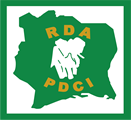As Côte d’Ivoire gears up for its presidential election scheduled for 25 October 2025, tension is building across the country following the disqualification of key opposition candidates and the recent arrest of several political activists. The situation is stirring fears of unrest and raising concerns about the fairness of the upcoming vote.
The African People’s Party–Côte d’Ivoire (PPA-CI), led by former President Laurent Gbagbo, has strongly condemned what it describes as growing political repression. The party said on Sunday, 27 July, that six of its members were arrested overnight between Saturday and Sunday, and taken to undisclosed locations. Among those arrested is a substitute deputy representing a district in Abidjan, the country’s economic capital.
Sébastien Dano Djédjé, the executive president of the PPA-CI, accused the government of targeting opposition voices to weaken their chances at the polls. “A wave of repression is sweeping across our leaders and activists,” he said during a press briefing. The party demanded the immediate release of its detained members.
The unrest comes shortly after violent incidents broke out in Yopougon, a key district in Abidjan, on the night of Friday, 1 August. Côte d’Ivoire’s Interior Minister, Vagondo Diomandé, confirmed that 11 people were arrested by security forces in connection to the violence.
Meanwhile, President Alassane Ouattara, aged 83, has announced his intention to run for a fourth term. His decision has further fueled political tensions, especially as many prominent opposition leaders have been barred from contesting the election. Court rulings have struck the names of Laurent Gbagbo (PPA-CI), Tidjane Thiam (PDCI-RDA), Charles Blé Goudé (former youth minister), and Guillaume Soro (former prime minister currently in exile) from the electoral register.
The exclusion of these figures from the race has sparked widespread criticism, with many opposition parties describing the move as a deliberate attempt to suppress democratic competition. They argue that the court decisions lack transparency and are politically motivated.
Adding to the growing concerns, the Ivorian Catholic Church has called for a peaceful and inclusive election process. The Bishops’ Conference of Côte d’Ivoire issued a pastoral letter last week urging authorities to ensure that all major candidates are allowed to participate in the elections. Archbishop Jacques Ahiwa of Bouaké, speaking to journalists, expressed concern over the rising political tension and the fear among citizens about a possible return to electoral violence.
“People are worried about a potentially violent election,” said Archbishop Ahiwa. “With every past poll, people have been afraid, and this is coming back. People are asking us to pray but also to act. As religious men, we must act to preserve peace.”
He warned that excluding popular political figures from the election could damage the democratic process and undermine trust in the system. “The lack of plurality is a serious concern. We must create platforms for dialogue and peaceful debate,” the Archbishop added.
The Democratic Party of Côte d’Ivoire–African Democratic Rally (PDCI-RDA), also raised alarm over the arrest of six youth leaders last week. The party said the circumstances of the arrests were “unclear” and “worrying,” accusing security forces of intimidation tactics.
Observers say the current political environment bears some resemblance to the 2010 post-election crisis that led to widespread violence and claimed over 3,000 lives. They have urged the government, opposition, and civil society to engage in open dialogue to prevent another national tragedy.
There is mounting pressure on the Independent Electoral Commission and the Constitutional Council to ensure transparency and fairness in the handling of electoral issues. The international community, including the African Union and ECOWAS, is also expected to keep a close watch on developments in Côte d’Ivoire in the coming weeks.
As the election date draws nearer, calls for peace, inclusivity, and democratic integrity continue to echo across the nation. For many Ivorians, the fear is not just about who wins the election, but whether the process will maintain national unity or push the country back into conflict.
